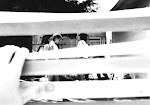How to See the Elephant - Prologue & Part I
"He was drawn in now. It had been like this during the war, in the hospitals. That was where I began to tell stories, and to recite, while I was nursing the sick and wounded. I told them about Katherine and stories from Mansfield, and being sent to Miss Barclay’s, and my escape, to find Pa, traveling across Pennsylvania and Ohio. They were easy stories, sometimes not quite true, the sadder parts skipped over, the funny parts played up. The men never tired of hearing them."
How to See the Elephant begins with Thetis Wymore telling her story in 1869. After her mother and brother die from cholera, her father takes a job as a travelling salesman and they follow a circuit through Pennsylvania and Ohio together.
"We were in somewhere in north-eastern Ohio in the rain and for miles it had been nothing but woods and fields and not a sign of human habitation. The rain was that steady rain of big drops with an even finer, steadier mist in between them; there were puddles in the ditches and the road and for hours on end we heard nothing but the constant whispering of the rain, along with the plop! plop! of big drops in the puddles. Inside or out, it was a day to drive you to suicide. I was sitting on my knees in the back of the wagon, right amongst all our stuff, so I could be under the tarpaulin and keep the rain off. My legs were cramped and my arms were tired from holding it up, but I was mostly dry."
Given a chance, in the spring of 1862, to join an Ohio regiment being raised by an old friend, her father takes it -- without consulting her.
“What’s going to happen to me?”
Pa was sitting in the parlor, in the armchair by the window. We were the only boarders in there at the moment. Pa tilted his head back and looked out the window at the jumble of trash and scrawny bushes around Mrs. Hammersmith’s double outhouse.
“Well, I’ve thought of two ideas. One is the Shakers. I could ride you down to Pleasant Hill in Kentucky. They’d take you in and you know ’em there. I think you’d be safe there, now that Donelson’s fallen, and it don’t look like Kentucky’s going to go out of the Union.”
“Yes,” I said vaguely.
I wasn’t thinking of any of the political stuff; I was thinking of how silent it was there and that the trees would go drip, drip all day long on rainy days and the nights would be pitch black.
“The other is to go to Miss Barclay’s in Wilmington.” He spoke slowly, as if this idea looked uncertain when exposed to daylight. “Amaryllis teaching there should swing us a discount on rates, and she’d look out for you. You’d get an education, too. Other stuff as well, I’m sure, but an education.”
We had been through Wilmington, Delaware last year on the way to Baltimore. I remembered a river and some factories.
I knew then what I wanted to say but I could not make my voice work. I knew that after Mama and Julius, after the cemetery, after the house in the days afterward, I had to accept my fate without asking questions."








2 comments:
you've an enjoyable voice & you've got some great imagery here! The rain was that steady rain of big drops with an even finer, steadier mist in between themi seem to remember hearing that 75,000 was the upper limit for YA -- either way, i wish you the very best!
I didn't intend for it to be so long. I think of myself as a concise writer. But it just grew and grew. Possibly it could be split into two volumes...
Post a Comment